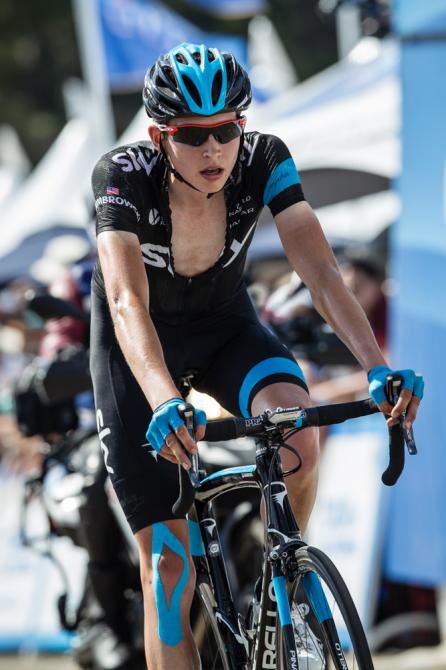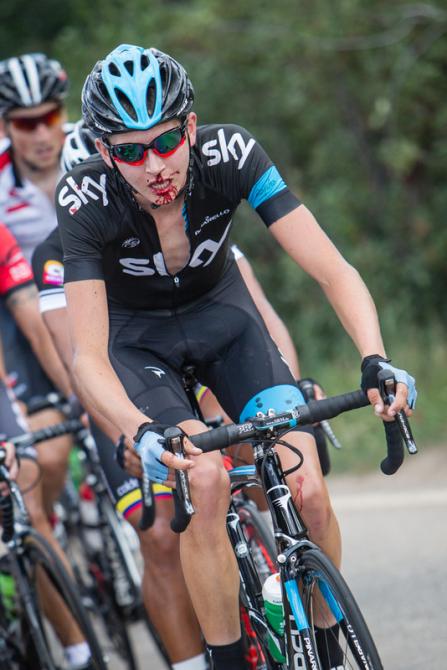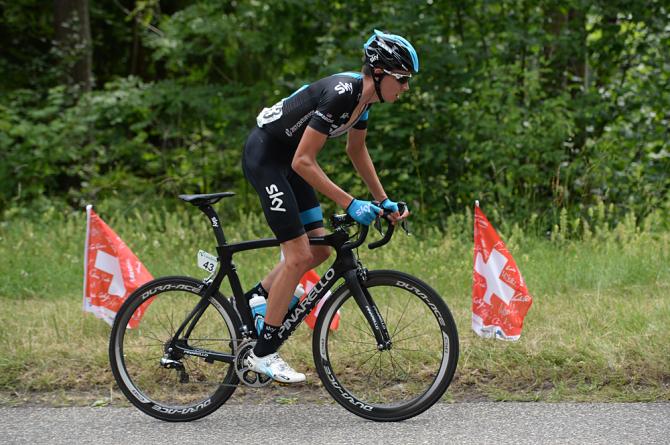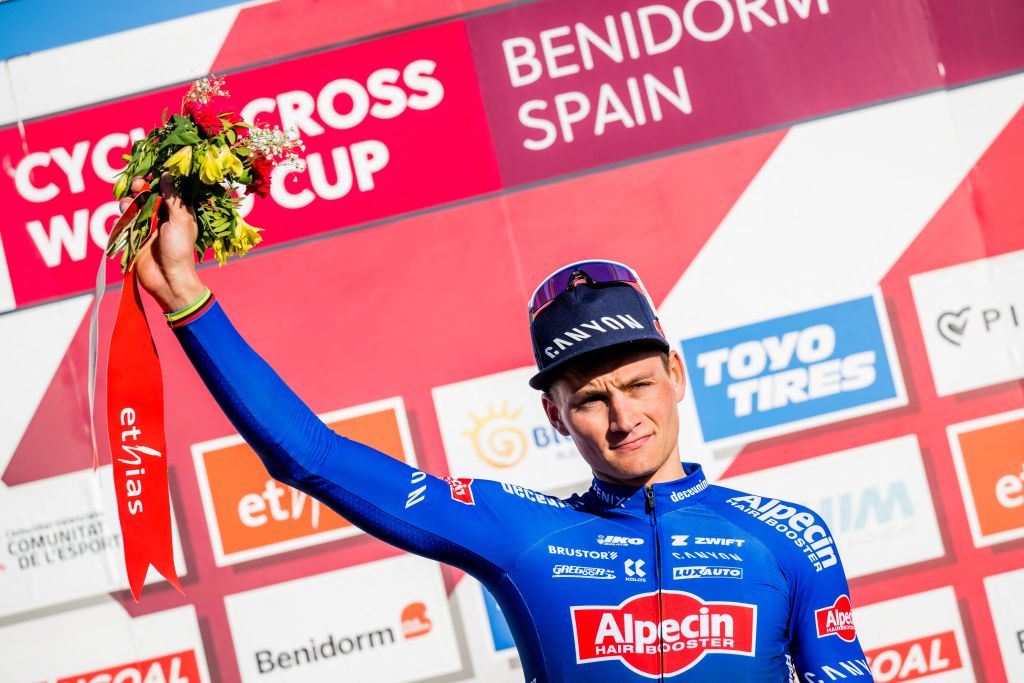Dombrowski looking for fresh start in 2015
Young American talks Garmindale and recovering from injury



Following two seasons with Team Sky that ended prematurely because of injury, Joe Dombrowski has signed a two-year deal with the new Cannondale team created by the merger with Jonathan Vaughters' Garmin-Sharp team.
The 23-year-old American has been recovering and training since surgery in July to repair an iliac artery injury that was finally diagnosed after the Tour de Suisse. It was just one part of a frustrating year for the Virginia native, who raced only 23 days in his final season with Team Sky, after knee pain and a loss of power, delayed this year's start.
Dombrowski, who won the Baby Giro in 2012 when he was just 20 years old, bounced back from the early season issues to play a key role in helping Bradley Wiggins win the Tour of California. He was 47th overall at the Tour de Suisse in June and finished 16th on the final stage, but a noticeable loss of power in his left leg and numbness in his foot led him to see a doctor who diagnosed a blood-flow problem. Surgery to correct the issue followed several weeks later, effectively ending Dombrowski's season.
Despite having been off his bike for several months, he lined up for one final hurrah in the Team Sky kit at the mid-September WorldTour races in Montreal and Quebec, but he didn't finish either event. Now Dombrowski is looking forward to joining the American WorldTour squad next year. Slipstream announced the deal that will take Dombrowski through the 2016 season earlier this month.
Cyclingnews caught up with Dombrowski last weekend while he spent some off-season time at home in Virginia.
Cyclingnews: Why the Garmin-Cannondale team?
Joe Dombrowski: There were a number of factors weighing in on the decision. There were a number of things that were appealing there. For one, being an American, an American team is obviously a nice place to be. It's certainly a bit more at home. Sky is obviously a British-based program, so it's not too far off, but in a European-based sport where we spend a lot of time overseas, there's something appealing about being on an American team.
The latest race content, interviews, features, reviews and expert buying guides, direct to your inbox!
So it's a good environment, but it also seems like a place where there are a lot of opportunities for all the riders on the team, which is something that I want to take advantage of. So I guess those are the two big things really. Environment and opportunity were the two things that sort of pushed me in that direction.
CN: Was Sky one of the teams that made you an offer during negotiations?
JD: Yeah. I did have an option to stay, but ultimately I declined that for a chance to go to Garmin, or I guess Cannondale, or maybe Garmindale.
CN: Did you feel like you got a fair chance with Sky, a fair opportunity to show them what you were capable of?
JD: I would say yes, for the most part. The thing was, like with this year, I had a pretty late start. I basically got started at California. I was having some knee problems before the Tour of California, and really, at the time I wasn't really sure what was going on. But with that same leg it turns out I had the issue with my artery. I don't know if those two issues were connected or not, but all of those issues kind of kept me out of racing for the majority of the season. I kind of got going at California, then I went back to Europe and did Tour de Suisse. After Suisse we finally figured out what was wrong. I came back to the US and had the surgery, and then I was off the bike for a couple of months.
I guess I never got to really even get going in my second year. After my first year I was really looking forward to the second, just because I felt like I had settled into the new team and into racing at the top level. I was more comfortable living in Europe. I had my apartment set up. All those little things that ultimately kind of weave into the big picture. So I guess I was a little bit disappointed in how it all played out. But when it played out the way it did, there's also not much you can do about it. When you have that sort of injury, you have to get it fixed. It is what it is. You make the best of it, try and get it fixed and then move on.
CN: When you were healthy in that California and Tour de Suisse period, you rode really well. You were there for Wiggins in California, especially at the end of the mountain top finishes. Does motivation from those performances help during the recovery?
JD: Yeah, definitely. The iliac artery issue dates back to the middle of my first season. We kind of knew something was wrong and that it was not really great for my performance. Sometimes I could still get it done, like at California and some of the other races where I had some decent rides. But now I'm back on the bike and everything seems to be OK. Working with the doctors and doing all the tests, everything looks like it's back to normal. It's definitely a good confidence boost that next year I can get a good, healthy, consistent season under my belt. Hopefully in a new team with both a fun environment and some good opportunities at my feet, I'd really like to take advantage of all that.
CN: Back to the opportunities ahead. Have you spoken with the team about what your program will look like next year?
JD: We've talked a bit. I mean other guys are still racing, so it's still pretty early, but I know roughly what some of the training camp dates look like. I'll probably start at Tour de San Luis. That way I can probably stay in the US over the winter. The after San Luis I'll head over to Europe and start with something like Catalunya, maybe. It's all still very early. That's what they said kind of tentatively, but you never know, especially when it's only October.
CN: The new team already has a pretty good stable of GC riders, how do you think you'll fit in there?
JD: I'm coming from Sky, which, in terms of depth of GC talent, is arguably the best in the world in that regard. So I think it will be fine in terms of finding opportunities. I know they've got their guys at Garmin that have already been with the team. Then with the merger they're bringing in – well, I guess it's not for sure yet – but tentatively some of those guys from Cannondale, who are young and very talented, could be coming over. So there's a lot of good riders on the team and some of them have similar characteristics to myself, but I don't really see finding opportunities as being an issue. There are so many races, and ultimately you just have to take opportunities when they come. And they do come. So I'm not so concerned about that. I'm sure that will be fine.
CN: What will you miss most about Team Sky? You kind of cut your WorldTour teeth there.
JD: At this point it's everything I know. Of course, I came through the Trek-Livestrong program, but that's very different to racing at the WorldTour. So it's hard to say. I guess if you were to ask me a few months after being with Garmin I'd have a better idea. But there were definitely a lot of really nice people that I met and worked with there. Just on a personal level, I'll miss working with them.
In addition, Sky is really highly organized, and the support network for riders, whether it's coaching, nutrition or just the logistics of getting to and from races, it's really pretty impressive. I'd say it's probably the most well organized team in cycling. So maybe I'll miss that, but it's hard to say until I go to others teams and see what other teams are like. But I think the biggest thing would probably just be the personal relationships. I've made friends with a lot of people on the team, but luckily, cycling is a pretty small world. I'm sure I'll see them again.
CN: What are you most looking forward to with the new team?
JD: For one, it will be a good environment. I already know a lot of the guys on the team. I know Ben King. I know Alex Howes. I know Nate Brown. I know basically all the Americans on the team already, and I know any number of the staff. So being in a familiar environment is always nice. Being an American in a very European sport, you know we're often outside are normal environment or what we're used to, so I'm looking forward to that. I guess just the overall vibe that I've gotten from the team so far. It's a serious environment, but it's a fun environment too.
And like I said earlier, it seems like it's a team of opportunists, and slotting into that program, hopefully I'll get some good opportunities to show what I can do.
CN: Ready to make your comeback?
JD: Yeah. Yeah. You know it was kind of strange watching all the races on TV. I still like to watch as a fan, but it was also a little bit hard to watch, like during the Vuelta and all that. Because I couldn't ride basically for a couple of months, and just sitting on the couch watching everybody else race while you're at home watching on TV is a little tough. But it's all good fuel for the fire, I suppose.
Growing up in Missoula, Montana, Pat competed in his first bike race in 1985 at Flathead Lake. He studied English and journalism at the University of Oregon and has covered North American cycling extensively since 2009, as well as racing and teams in Europe and South America. Pat currently lives in the US outside of Portland, Oregon, with his imaginary dog Rusty.
